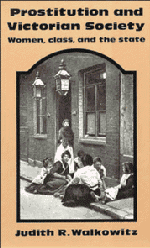Book contents
- Frontmatter
- Contents
- Preface
- Introduction: The Revolt of the Women
- Part I Prostitution, Social Science, and Venereal Disease
- Part II The Contagious Diseases Acts, Regulationists, and Repealers
- 4 The Contagious Diseases Acts and Their Advocates
- 5 The Repeal Campaign
- 6 The Leadership of the Ladies' National Association
- 7 Class and Gender Conflict Within the Repeal Movement
- Part III Two Case Studies: Plymouth and Southampton Under the Contagious Diseases Acts
- Epilog
- Notes
- Selected Bibliography
- Index
4 - The Contagious Diseases Acts and Their Advocates
Published online by Cambridge University Press: 01 June 2011
- Frontmatter
- Contents
- Preface
- Introduction: The Revolt of the Women
- Part I Prostitution, Social Science, and Venereal Disease
- Part II The Contagious Diseases Acts, Regulationists, and Repealers
- 4 The Contagious Diseases Acts and Their Advocates
- 5 The Repeal Campaign
- 6 The Leadership of the Ladies' National Association
- 7 Class and Gender Conflict Within the Repeal Movement
- Part III Two Case Studies: Plymouth and Southampton Under the Contagious Diseases Acts
- Epilog
- Notes
- Selected Bibliography
- Index
Summary
I trust then before many years have passed away England too will have a “Bureau des Moeurs” with a Minister of Health, at its head, a large and efficient staff of medical officers in every town and throughout the length and breadth of the land as well as sanitary police, entrusted with the working of the C.D. Acts, the Vaccination Act, the Factory Act, and the suppression of public nuisances, obscene literature … and demoralizing exhibitions of every kind – for gentlemen, the end of Government is the Good of Mankind.
—Dr. C.W. Shirley Deakin, The Contagious Diseases Acts, 1864, '66, '68, (Ireland), '69 from a Sanitary and Economic Point of ViewHistorical interest in the Contagious Diseases Acts has principally focused on their cultural importance as explicit manifestations of mid-Victorian social and sexual ideology. This cultural interpretation, although important, has generally been presented in isolation from the political background surrounding passage of the acts and the administrative machinery and medical technology that facilitated their operation. The separation of the ideological and the practical origins of the acts has distorted the historical picture by making the acts appear to express a more programmatic and coherent social policy than was actually the case.
This chapter will offer a corrective to this oversimplified approach by investigating the interaction between ideology and its implementation under the acts. It will also examine the changing public rationale for the acts, from limited sanitary measures to far-reaching pieces of social legislation.
- Type
- Chapter
- Information
- Prostitution and Victorian SocietyWomen, Class, and the State, pp. 69 - 89Publisher: Cambridge University PressPrint publication year: 1980
- 1
- Cited by



